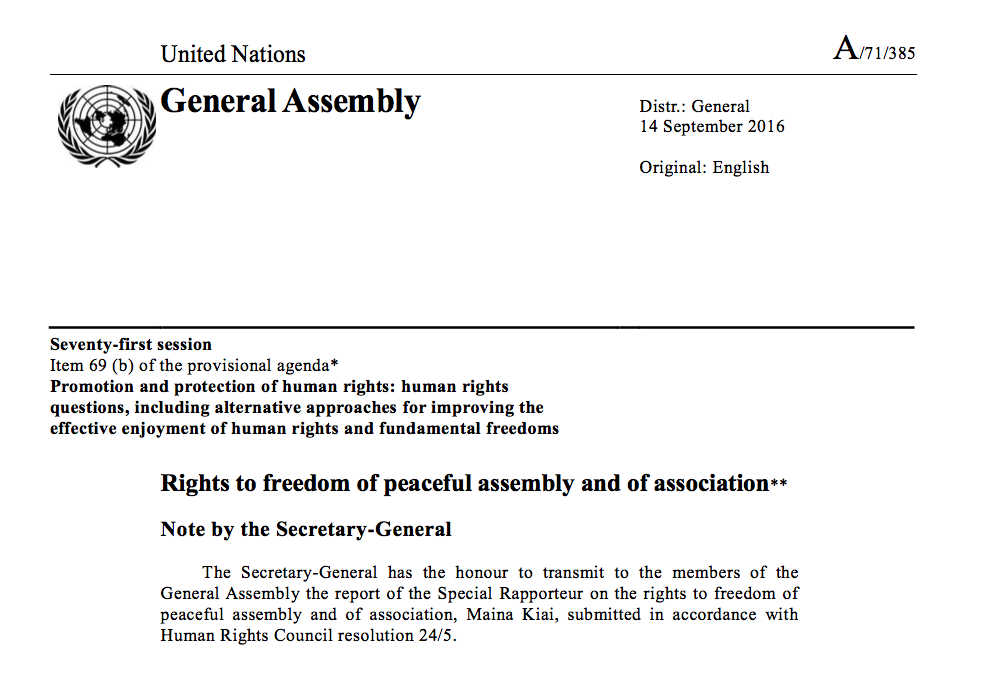21 Oct 2016
UN report shows workers getting screwed by globalisation
Brussels, 20 October 2016 (ITUC OnLine): The ITUC has welcomed the publication of a major new UN report on the right to freedom of assembly and association, and called on governments to act on its findings. The report, by UN Special Rapporteur and distinguished Kenyan lawyer Maina Kiai, is to be presented to the UN General Assembly in New York on 20 October.
In Kiai’s own words, “Our world and its globalised economy are changing at a lightning pace, and it is critical that the tools we use to protect labour rights adapt just as quickly,” the Special Rapporteur writes in the report. “A first step towards this goal is to obliterate the antiquated and artificial distinction between labour rights and human rights generally. Labour rights are human rights, and the ability to exercise these rights in the workplace is prerequisite for workers to enjoy a broad range of other rights, whether economic, social, cultural, political or otherwise.”

Amongst its key conclusions, the report finds that:
(+) Workers have little leverage to change the conditions that entrench poverty, fuel inequality and limit democracy;
(+) Millions of informal workers labour in global supply chains, where some of the worst abuses of freedom of association and peaceful assembly are found and where migrant workers are often concentrated; and
(+) Discrimination, abuse and relegation to jobs at the bottom of the global economy undermine women’s ability to join and form organisations that defend their interests.
This is the ITUC’s comment:
In recent decades, globalization has led to a rise in economic productivity and wealth, but it has also contributed to a dramatic increase in the power of large multinational corporations and concentrated wealth in fewer hands. At the same time, States’ power to regulate these business entities has eroded — and in some cases been voluntarily ceded in order to attract these businesses.
This new global economic order has had a profound impact on workers’ ability to exercise their rights to freedom of peaceful assembly and of association. Labour’s traditional tools for asserting rights – trade unions, strikes, collective bargaining and so on – have been significantly weakened across the globe. The majority of the world’s workers find themselves excluded from national legal protective frameworks, while some are not even defined as “workers.” This situation has left vast swathes of the world’s labour force unable to exercise their fundamental rights to associate or assemble, and without access to remedies when their rights are violated.
In this report, the Special Rapporteur examines how and why this has happened, focusing on the most marginalized portions of the world’s labour force, including global supply chain workers, informal workers, migrant workers, domestic workers and others. He finds that although States are obligated under international law to respect and promote workers’ rights to freedom of peaceful assembly and of association, many are dismally failing at this task.
The implications this failure are grave. Assembly and association rights are a critical tool in leveling the unequal relationship between workers and employers, which in turn helps workers correct abuses and gain access to fair wages, safe working conditions and collective voice. Poor enforcement of these rights in the workplace can also exacerbate global inequality, poverty, violence, child and forced labour, and directly contributes to problems such as human trafficking and slavery. For this reason, the Special Rapporteur concludes that the trend of prioritizing economic and corporate interests at the expense of workers’ rights is not only a rights issue; it has the potential to undermine the viability of the world’s economic system.
“Our world and its globalized economy are changing at a lightning pace, and it is critical that the tools we use to protect to labour rights adapt just as quickly,” the Special Rapporteur writes in the report. “A first step towards this goal is to obliterate the antiquated and artificial distinction between labour rights and human rights generally. Labour rights are human rights, and the ability to exercise these rights in the workplace is prerequisite for workers to enjoy a broad range of other rights, whether economic, social, cultural, political or otherwise.”
Said ITUC General Secretary Sharan Burrow, “We congratulate Maina Kiai on this landmark report, bringing the struggles of workers from around the world to the heart of the United Nations. Millions upon millions of workers are denied the right to organise and decent work by governments and through the actions of employers including some of the world’s best-known companies. Governments need to act to ensure these rights, to end the twin scandals of poverty and exploitation in supply chains, and to formalise informal work,” .
Workers from Mexico, Honduras, Hong Kong and Swaziland will give testimony at a special event http://www.solidaritycenter.org/special-un-report-worker-rights-key-human-rights/ , co-sponsored by the ITUC, AFL-CIO Solidarity Center and others, in New York on the day following the presentation of the report to the General Assembly.
